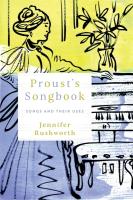
By Jennifer Rushworth
I first read Proust when I was a first-year student studying French and Italian at Worcester College, Oxford. We only read the first few hundred pages, but I was entranced by the writing about nature, childhood, family, and memory. Since then, I have read the whole of Proust’s novel more than a few times and have developed a particular interest in the role of music within it.
Proust’s approach to music is intriguing because in his novel he mainly writes about the imaginary music of a fictional composer called Vinteuil. This music exists only on the page, through the medium of the written word. In addition to being an opportunity for virtuosic purple prose, Vinteuil’s music has predominantly the narrative function of inspiring the narrator on his own vocational journey towards becoming a writer.
Readers of Proust have often wondered whether Vinteuil might be based on a real composer such as Franck, Saint-Saëns, Debussy, or similar. Proust himself denied any such identification, asserting the supremacy of the imagination and claiming that, even in cases where he had been inspired by the real world, everything in his novel is composed of a multitude of real-life sources or ‘keys’. In short, the importance of the music of Vinteuil lies in its ideal unreality: because it is imaginary music, it cannot disappoint the reader, since it exists only in the imagination.
That said, I have wondered whether Proust’s descriptions of Vinteuil’s music, if not based on any identifiable real music, might be the catalyst for new music. In the academic year 2016–17, I was lucky to receive a grant from the John Fell OUP Research Fund to run a project called Bringing Proust’s Imaginary Music to Life. I worked with student translators, composers, and performers at the University to create two new works for violin and piano inspired by Proust’s writings, culminating in a glorious final performance of music and readings in the Holywell Music Room. I am always eager to hear how other people respond to Proust, and it was especially exciting to have the perspective of musicians on his prose.
More recently, I have sought to contextualise Proust’s invention of purely fictional music within its broader cultural context. After all, Proust may have written chiefly about imaginary music, but throughout his life he was surrounded by real music and real musicians. My latest book, Proust’s Songbook (Penn Press, 2024), examines the overlooked role of real songs and real song composers in Proust’s novel, especially Schubert, Schumann, and Massenet.
Foremost in Proust’s circle was the composer, singer, and theorist of song Reynaldo Hahn. Proust and Hahn met in the mid-1890s in a musical and artistic salon. Their romantic relationship lasted around two years, but their intimate friendship continued until Proust’s death in November 1922. Proust thought that Hahn had the most beautiful, warm voice he had ever heard, but he also admired Hahn as a writer, especially his lectures on song.
The relationship between Proust and Hahn was recently explored and celebrated in a concert In Search of Lost Love at the Sheldonian in February 2024, organised as part of the new Cultural Programme and featuring Kaleidoscope Chamber Collective (led by pianist Tom Poster and violinist Elena Urioste) in collaboration with Schola Cantorum of Oxford. To introduce the concert, I was joined by Simon Kemp (Somerville) and Jennifer Yee (Christ Church). Listening together to readings from Proust’s correspondence with Hahn and other moving texts, we explored Proust’s involvement in real music and with real composers, and his participation in literary and musical salons where there was much interplay between writers, musicians, music-lovers, and the arts more generally. We witnessed Proust’s affection for art song, in contrast to his better-known love of Beethoven’s symphonies and Wagner’s operas. We also explored Hahn as more than a creator of exquisite song, hearing extracts from his diaries and lectures and, in the second half of the concert, his beautiful piano quintet.
Proust’s representation of music, and the role of music in his life, have captured my interest since undergraduate days. More generally, his work is a reminder of the importance and fruitfulness of examining the relationship between different arts, and especially how different arts represent, imagine, and even define themselves against one another. Beyond Proust, I am looking forward to the imminent publication a co-edited volume on Song in the Novel (Oxford University Press for the British Academy, 2024). This book explores the role and function of songs and singing in novels across a variety of languages and centuries and includes essays by Oxford academics Philip Ross Bullock, Elizabeth Eva Leach, and Catriona Seth.
Oxford is such a special, inherently interdisciplinary place, with its rich musical life and many opportunities for performance and collaboration. As a resident of Jericho, I am excited to see how the new Stephen A. Schwarzman Centre for the Humanities will gather different disciplines together and enable students and researchers to engage ever more closely with leading practitioners and performers from around the world.